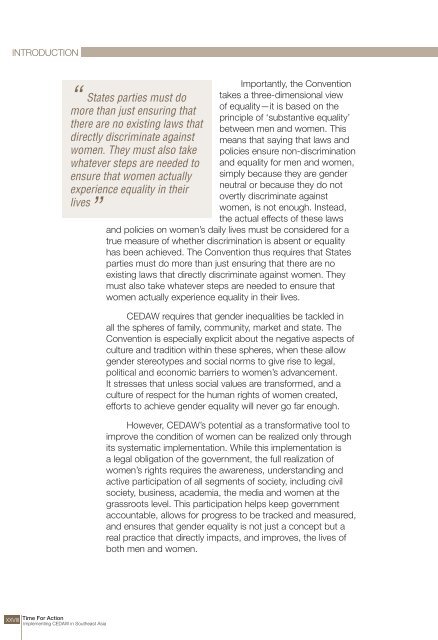Time for Action: Implementing CEDAW in Southeast Asia
Time for Action: Implementing CEDAW in Southeast Asia
Time for Action: Implementing CEDAW in Southeast Asia
You also want an ePaper? Increase the reach of your titles
YUMPU automatically turns print PDFs into web optimized ePapers that Google loves.
INTRODUCTION<br />
“<br />
Importantly, the Convention<br />
States parties must do takes a three-dimensional view<br />
of equality—it is based on the<br />
more than just ensur<strong>in</strong>g that<br />
pr<strong>in</strong>ciple of ‘substantive equality’<br />
there are no exist<strong>in</strong>g laws that between men and women. This<br />
directly discrim<strong>in</strong>ate aga<strong>in</strong>st means that say<strong>in</strong>g that laws and<br />
women. They must also take policies ensure non-discrim<strong>in</strong>ation<br />
whatever steps are needed to and equality <strong>for</strong> men and women,<br />
ensure that women actually simply because they are gender<br />
neutral or because they do not<br />
experience equality <strong>in</strong> their<br />
overtly discrim<strong>in</strong>ate aga<strong>in</strong>st<br />
lives women, is not enough. Instead,<br />
”<br />
the actual effects of these laws<br />
and policies on women’s daily lives must be considered <strong>for</strong> a<br />
true measure of whether discrim<strong>in</strong>ation is absent or equality<br />
has been achieved. The Convention thus requires that States<br />
parties must do more than just ensur<strong>in</strong>g that there are no<br />
exist<strong>in</strong>g laws that directly discrim<strong>in</strong>ate aga<strong>in</strong>st women. They<br />
must also take whatever steps are needed to ensure that<br />
women actually experience equality <strong>in</strong> their lives.<br />
<strong>CEDAW</strong> requires that gender <strong>in</strong>equalities be tackled <strong>in</strong><br />
all the spheres of family, community, market and state. The<br />
Convention is especially explicit about the negative aspects of<br />
culture and tradition with<strong>in</strong> these spheres, when these allow<br />
gender stereotypes and social norms to give rise to legal,<br />
political and economic barriers to women’s advancement.<br />
It stresses that unless social values are trans<strong>for</strong>med, and a<br />
culture of respect <strong>for</strong> the human rights of women created,<br />
ef<strong>for</strong>ts to achieve gender equality will never go far enough.<br />
However, <strong>CEDAW</strong>’s potential as a trans<strong>for</strong>mative tool to<br />
improve the condition of women can be realized only through<br />
its systematic implementation. While this implementation is<br />
a legal obligation of the government, the full realization of<br />
women’s rights requires the awareness, understand<strong>in</strong>g and<br />
active participation of all segments of society, <strong>in</strong>clud<strong>in</strong>g civil<br />
society, bus<strong>in</strong>ess, academia, the media and women at the<br />
grassroots level. This participation helps keep government<br />
accountable, allows <strong>for</strong> progress to be tracked and measured,<br />
and ensures that gender equality is not just a concept but a<br />
real practice that directly impacts, and improves, the lives of<br />
both men and women.<br />
XXVIII <strong>Time</strong> For <strong>Action</strong><br />
<strong>Implement<strong>in</strong>g</strong> <strong>CEDAW</strong> <strong>in</strong> <strong>Southeast</strong> <strong>Asia</strong>

















